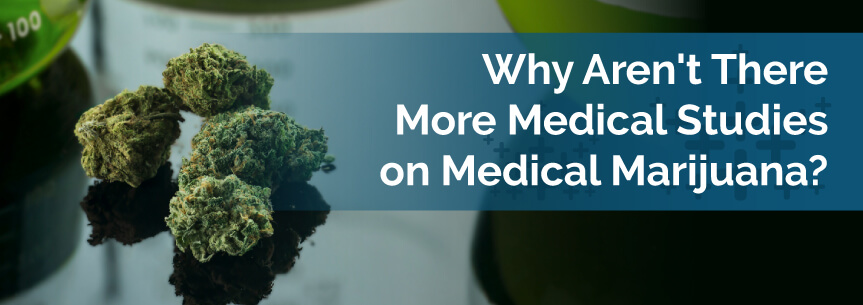
There is lots of conflicting information on the benefits of medical marijuana, so why aren’t there more studies to get the facts? Here are some of the difficulties that scientists face when trying to study cannabis for medical use.
Research into medical marijuana, in the U.S. at least, is stuck in a sort of vicious cycle. On the one hand, there is a lack of universally accepted evidence regarding the benefits of marijuana. On the other, it is almost impossible to produce that evidence because of the roadblocks set up by the U.S. government. In order to perform the research needed to prove the benefits of medical marijuana, scientists would have to possess the plant — and that is illegal under federal law. Marijuana remains classified as a “Schedule I” drug along with deadly drugs such as heroin. As a result, merely possessing it makes you a criminal in the eyes of the federal government.
The chasm that exists between the scientific community and the federal government when it comes to research is made even more complicated by the fact that about one million people in the U.S. are prescribed medical marijuana each year. Add in that 28 states have either made medical marijuana legal or have completely decriminalized the drug, and the situation gets even more muddled.
The biggest hurdle to performing rigorous, scientific research into the medical benefits of cannabis is the fact that marijuana continues to be saddled with the Schedule I stigma. There continues to be the belief that cannabis is much more of a danger to society than the evidence shows. The American Medical Association is just one of many groups that are calling for a reclassification to Schedule II, which would open the door at least a bit for more research to be performed.
This reclassification would still acknowledge the risks of marijuana abuse, but it would also acknowledge the drug’s medical benefits. It would also make it more likely that pharmaceutical companies would ask the Food and Drug Administration (FDA) for permission to thoroughly test the drug in humans as well as animals to determine once and for all whether marijuana’s benefits outweigh its risks.
Another maddening aspect of this frustrating situation is that marijuana is one of the only Schedule I drugs that the federal government does not allow to be produced for research by private labs. There is only one facility in the country that has a contract to grow marijuana for research (located in Mississippi).
There is simply no telling how long this Catch-22 will continue. The U.S. government basically says that FDA approval is needed to take marijuana off the Schedule I list. Yet, at the same time, it is obstructing the research necessary for the FDA to approve reclassification. Even though public opinion has significantly turned regarding the acceptance of marijuana, convincing government officials is an entirely different matter.
For the sake of argument, let’s just say the U.S. government one day lifts Schedule I restrictions on marijuana and fully opens the door to medical researchers. What kind of research would need to be performed to finally prove to everyone that marijuana has medical benefits?
First, tightly controlled double blind (or even triple blind) testing would have to take place. This process typically starts with an assumption. For example, ingesting X milligrams of a certain substance will lead to the recipient suffering fewer colds than someone receiving a placebo. Or, there could be an additional control group that doesn’t receive either the substance or a placebo.
In a perfect testing situation, no one — not even the person administering the drug — would know who is getting the substance and who is getting the placebo. Once a predetermined amount of time has passed, researchers would check the results.
If the group receiving the substance suffers approximately the same number of colds as the placebo as well as the control groups, that would indicate the substance is probably useless in preventing colds. If, on the other hand, the group taking the substance suffered a significantly reduced number of colds, that would be an indication that further research would be justified. This experiment would have to be repeated several times and yield similar results before any reliable cause-and-effect relationship could be determined.
But that would only be the first step. Even if a cause-and-effect relationship were to be established, that in itself wouldn’t be enough to compel everyone to agree that the substance does, in fact, reduce colds. The would still be myriad skeptics who would need much more convincing. Research would have to be published in peer-reviewed journals, giving other scientists the opportunity to not only attack the methodology of the study, but its conclusions as well.
If, however, the research passed this phase, it would still be a long, long time before the cold cure would obtain FDA approval. It can take six years or more for the FDA to investigate an experimental drug and then deliberate regarding its effectiveness. When you add this process to the time it takes to perform thorough research, the entire time frame can easily take eight to 12 years.
This is not a criticism of the FDA’s process by any means. It is much more important to be deliberate and right than to be haphazard and wrong when it comes to approving drugs.
Unfortunately, however, we’re not even at the research stage in the U.S. when it comes to marijuana. Until the stigma — and more importantly the Schedule I classification — associated with marijuana fades away, meaningful research simply will not be able to move forward. It will take patience and a great deal of effort to convince those in positions of power that the time to allow this research is long overdue.
No Information on MarijuanaDoctors.Com should be used to diagnose, treat, prevent or cure any disease or condition. You can view our Full Disclaimer here.